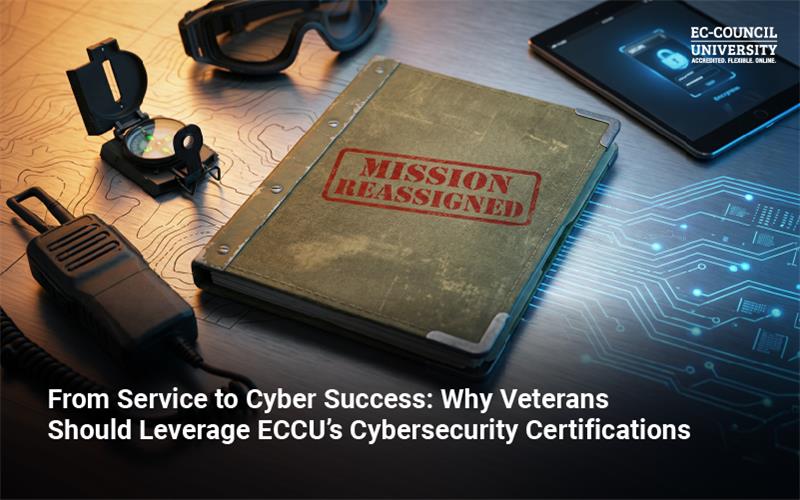Beyond the Service: Redefining Your Future
Transitioning out of service is not just about landing a new job. It is about rediscovering who you are outside of service. Discovering your new career goals and what truly matters to you in the next chapter of life. For many, this stage is unclear or undefined, but a decision driven by the work that will keep you challenged, motivated, and proud.
Cybersecurity stands out because it offers variety, growth, and flexibility to align with your evolving goals and aspirations. Cybersecurity for service members and veterans provides more than just stability. It can be rewarding, impactful, and fulfilling.
Discover options that give you room to explore, learn, and carve your unique cybersecurity journey.
Top Cybersecurity Career Paths Perfect for Transitioning Service Members
Your service gave you the experience and the mindset built for challenges and problem-solving. So, cybersecurity comes as a natural next step. It offers a career that is in high demand and has a meaningful impact. Whether you want to continue serving national security interests or explore the corporate world, there are multiple career paths where your skills can make an immediate impact.
A. Cybersecurity Roles in National Security and Defense
Service members and veterans who want to continue contributing to national defense and intelligence missions can find opportunities within federal agencies, defense contractors, and military cyber units.
Where You Could Possibly Work:
- US. Department of Defense (DoD)
- Department of Homeland Security (DHS)
- Intelligence agencies (NSA, CIA)
- Defense and intelligence contractors
The Impact of Your New Role:
You will protect critical infrastructure, classified systems, and national security assets from cyber threats by operating in high-trust, high-impact environments.
Why Is It the Best Fit for You:
- Leverages your clearance and mission-driven mindset
- Offers steady career progression and leadership potential
- Aligns with public service and national security goals
What Maybe Your Career Outlook:
Consistent demand with opportunities for advancement into leadership roles in cyber operations, intelligence analysis, cyber policy, and more.
B. Cybersecurity Roles in the Private Sector Corporate
The private sector offers dynamic cybersecurity careers across technology, finance, healthcare, manufacturing, and more industries. These roles are ideal for service members seeking a stable and rewarding career with room for career advancements.
Where You Could Possibly Work:
- Fortune 500 companies
- Cybersecurity firms and startups
- IT, banks, hospitals, and cloud service providers
- Managed security service providers (MSSPs)
The Impact of Your New Role:
You will help protect critical business infrastructure, digital assets, and data from cyber-attacks.
What Are the Common Roles:
- Cybersecurity Analyst
- Security Operations Center (SOC) Specialist
- Cloud Security Engineer
- Risk & Compliance Analyst
- Incident Responder and more
Why Is It the Best Fit for You:
- Strong demand and job security
- Competitive salaries and benefits
- Opportunities to specialize based on your interests (e.g., cloud, forensics, penetration testing)
- Clear pathways to leadership and executive roles
What Maybe Your Career Outlook:
The private sector faces a significant cybersecurity talent shortage. It is an excellent time to transition with in-demand skills and certifications.
Transitioning into Cyber Roles Within DoD While on Active Duty
The transition does not have to wait. The Department of Defense (DoD) may provide direct pathways into cyber roles if you are on active duty. Whether through reclassification or lateral movement, each military branch offers cyber specialties aligning with defense missions and post-service opportunities. Assuming the new cybersecurity roles within these departments will require you to qualify for the aptitude, security clearance, and other criteria deemed requirements.
Army – U.S. Army Cyber Command (ARCYBER)
Reclassify into cyber roles like MOS 17C Cyber Operations Specialist or 170D Cyber Operations Technician, focusing on cyber warfare, threat intel, and defense operations.
Navy – Fleet Cyber Command / Tenth Fleet
Pursue cyber warfare or information warfare roles with cryptology and secure communications training.
Air Force – Sixteenth Air Force (Air Forces Cyber)
Serve in cyber operation roles include AFSC 1B4X1 -Cyber Warfare Ops and 17X-Cyberspace Officer, protecting satellite systems, drones, and mission networks.
Marine Corps – MARFORCYBER
Join the 1700 Cyberspace Operations Occupational Field for red/blue team ops, cyber defense, and integrated mission support.
Coast Guard – CGCYBER
Work in cyber and policy roles safeguarding U.S. maritime and critical infrastructure.
Space Force – U.S. Space Command
Specialize in cyber defense of space assets through roles like the 17S Cyberspace Effects Officer and 1B4 Cyber Warfare Operator.
Envisioning Your Cybersecurity Career Path
When it comes to shaping your cybersecurity career, there is no standard career path. Your journey depends on how clear you are about your personal goals, lifestyle preferences, and professional ambitions. Whether you are entering the field with a defined direction or still exploring your options, this is a critical period to design a career path that is financially secure, personally fulfilling, and sustainable for you in the long run.
Here is how to think strategically and take the proper steps toward a rewarding career in cybersecurity:
1. Explore Before You Commit
If you are still figuring out your niche, use this time as a discovery phase. Enroll in short-term courses, certifications, or training programs that expose you to technical, compliance, risk management, or strategy areas. Think of it as reconnaissance, and you are surveying the landscape to see where you thrive. This approach allows you to test roles without full commitment, helping you find a path that excites you and aligns with your strengths.
2. Match Your Interests with Education
Once you have identified areas that interest you, invest in a graduate program or degree that supports and provides specialization in threat intelligence, forensics, cloud security architecture, etc. A focused education and degree help you quickly advance into higher roles, build credibility, and have an edge in the competitive field.
3. Align Career with Lifestyle Goals
Cybersecurity roles vary greatly in pace and structure. Some roles require working around in a fast-moving, high-pressure environment, while others may be predictable, process-driven work. Choose a career path that supports your work-life balance.
4. Think Beyond Job Titles
Your cybersecurity journey does not end with landing your first job. It is about long-term growth, advancing from technical roles to leadership and strategic positions. The field offers clear pathways into roles like Security Manager, Director of Information Security, or CISO. Choosing a degree program focused on cybersecurity leadership and management can position you for these senior roles.
5. Build a Professional Identity
Success in cybersecurity also comes from community and connection. Engage with industry peers, attend cybersecurity events, and tap into veteran-friendly programs if transitioning from the military. Networking helps you understand where you fit in and what opportunities are open to you
Leverage Your VA Education Benefits for a Cyber Security Career
Post-service, your GI Bill® VA education benefit is a powerful avenue that can support your transition into a meaningful cyber career. The Department of Veterans Affairs (VA) offers a range of education benefits to help veterans and service members like you and your families transition into cybersecurity. Depending on your eligible VA education benefit programs, here is how to use them strategically to your benefit:
1. Post-9/11 GI Bill® (Chapter 33)
Typically includes full or partial coverage of tuition, housing, books, and fees for eligible veterans with active-duty service.
2. Montgomery GI Bill® – Active Duty (MGIB-AD, Chapter 30)
May include monthly education payments to veterans who served at least two years on active duty and contributed to the program.
3. Montgomery GI Bill® – Selected Reserve (MGIB-SR, Chapter 1606)
Might offer educational assistance for members of the Selected Reserve enrolled in approved training or education programs.
4. Veteran Readiness and Employment (VR&E, Chapter 31)
Could include education, training, and career support services for veterans with service-connected disabilities seeking to reenter the workforce
5. Veterans Educational Assistance Program (VEAP – Chapter 32)
May qualify veterans to receive matched funds for education based on their active-duty contributions
6. Dependents Educational Assistance (DEA – Chapter 35)
Possibly assist eligible spouses and children of disabled or deceased veterans with education expenses.
7. Fry Scholarship
Could extend Post-9/11 GI Bill® benefits to children and spouses of service members who died in the line of duty after September 10, 2001.
8. Transfer of Education Benefits (TEB)
May permit eligible service members to share unused Post-9/11 GI Bill® benefits with a spouse or child for educational use.
Build Your Cyber Security Career Path with Clarity and Confidence
Transitioning is not about fitting in but about creating a unique path that aligns with your goals. Create a career that aligns with your vision of growth, impact, and personal satisfaction. Whether you start from complete uncertainty to laser-focused goals, your cybersecurity career should be built with intent and flexibility. Cybersecurity offers multiple entry points from defense to the private sector to education, each with different growth opportunities.
Take the time to explore, learn, and invest in yourself, and the right cybersecurity career path will follow. EC-Council University is veteran-friendly and approved to accept eligible students with VA education benefits for cybersecurity programs. Explore to learn more about the approved cybersecurity and IT programs.







